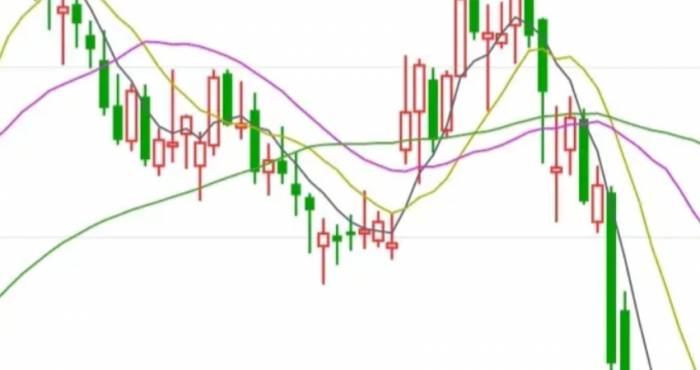The essence of trading is to test and capture major market trends with continuous small losses.
Investment is a relatively simple money game when you are not truly involved, but it becomes quite complex once you participate. If you want to survive for a long time and make continuous profits, you must fully understand the nature of investment, truly master a set of correct investment concepts and methods that suit yourself. In this case, the financial market is your ATM, otherwise, it is a money-eating slot machine.
The vast majority of people have little prospect in speculation because this devilish skill is too simple, so simple that most people turn a blind eye to it. Investment is a primitive low-level world, and humans always view the low-level world with advanced eyes. Infinitely complicating the extremely simple is the main reason why most people ultimately cannot succeed.
Do not always expect to make a profit every time, but follow the market trend closely according to an excellent trading system, using continuous small losses to test and capture major market trends. As long as you have the courage and continuously repeat the above operations, you will be able to defeat the market, accumulate wealth, and this is the essence of trading. Trading itself is a continuous trial and error process, exchanging smaller losses for greater profits. Trading is an operation and management that strictly controls the proportion of losses and closely follows the market trend, using continuous small losses to test and capture major market trends.
Sometimes, each of us may feel that fate is unfair to us and feel that we are unlucky, but when we calm down and think about a question, opportunities and luck must first be given to those who are prepared. When we do anything, are you ready?
Being prepared does not guarantee success, and if you can succeed without being prepared, then success is too simple.
Many people claim to be prepared, but on the other hand, they ask where the opportunity is and how to find it? This is the preparatory work that needs to be done. If you can't even discern what is an opportunity, then what kind of preparation have you made?
Opportunities pass by you one by one, brushing past you, and you don't see them, and you don't judge that this is an opportunity, thinking it's a trap, and avoiding it, what's the use of that?
When the opportunity comes, you must be prepared first, which is a prerequisite. If you are not prepared, it has nothing to do with you. If you are prepared, how to seize this opportunity still requires your diligence, your keenness, your courage, and your stress resistance, etc. It is the result of a combination of many factors, which cannot be fully expressed in a single sentence.You need to be prepared to discern opportunities — understanding the essence of things.
You need to be prepared to seize opportunities — accumulating your own advantages.
All these are prepared, and only with good preparation do opportunities become meaningful to you. The rest is patience and luck. Always be ready, waiting for the right moment to act, and waiting for the favor of the Goddess of Fortune.
Regarding plans and goals, this has always been a controversial issue: whether to make plans or set goals?
Definitely! It is a very important ability that requires preparation.
Some people like short-term operations, so they can test their short-term judgment ability with a three-day deadline. After being comfortable with three days, they can gradually try three weeks, three months, one year, and so on... After each stage, they can take a break and give themselves a small reward.
Ordinary people don't need to make too long-term plans because they can't stick to completing them. Generally, they can follow this half principle:
Experience + Reflection = Preparation
Those who only think without experience are daydreamers;
Those who only have experience without reflection, as a song goes, "How many people walk but are trapped in the same place, how many people live but are as if they are dead..." Many people are proud to think that they have five or ten years of experience, but in fact, they often just repeat one year's experience five or ten times. They will soon be surpassed by those who know how to learn from one example.Translate the following passage into English:
1. Retail investors are inherently the weak in the stock market.
2. They lack the correct investment philosophy and knowledge.
3. They have weak professional knowledge and poor judgment ability.
To maintain profitability in stock trading, remember these five small points:
1. Do not buy if you do not know the value.
The secret of investment is to find out the value of the target and then acquire it at a cost far below that value. If you decide to invest without understanding the value of the target, the chance of success is slim.
How much is a company's stock worth? It's actually not difficult to calculate; it's just that professional investors and scholars make it too complicated.
How much interest will a company pay you? This is also not difficult to calculate.
2. Do not buy investment products that you cannot compare or do not understand.
If you are not familiar with the industry or the products and services the company provides, do not buy its stocks. In the investment market, no one forces you to buy a specific stock; you have thousands of companies to choose from.Do not follow the entry and exit of institutions and legal entities.
No matter what strategy is adopted, "confronting head-on" is likely to be the wrong choice. If you want luck to be on your side, you must change the rules of the game and look for stocks that large investment institutions have not touched.
4. Do not buy overly complex products (such as mutual funds):
The performance of fund managers only represents the present and does not guarantee the future. Moreover, the way funds invest in both good and bad stocks together cannot pursue maximum profits.
5. Do not deal with emotions!
The market is very emotional and tends to be overly optimistic or overly pessimistic. As a result, stocks often fluctuate dramatically in the short term. Only investors who focus on "value" can stay away from such emotional fluctuations. At present, "almost" all funds are as emotional as the market.
You need to understand:
1. Retail investors are not "leeks". I have proven through my own practice that retail investors can achieve sustainable and stable profits. To achieve sustainable profits, you must first recognize several basic issues. The stock market can make a lot of money, but it is not about making quick money. You need to lower your expectations for returns, and achieving an average annual profit of 10% is already very good. The stock market is an amplifier of wealth, not an ATM. The stock market makes money from the growth of companies, not from other participants. Be patient and learn to become wealthy slowly.
2. Never losing the principal is always the top priority. Survival comes first, and making money comes second. All my strategies and operating methods are based on not incurring losses. First, protect the principal, and with the compound interest of time, you can achieve a significant increase in wealth in the future. Losses are the biggest obstacle to wealth appreciation. If you suffer a 50% loss, you need to make a 100% profit to break even.
3. Do not buy if you do not understand. Make money within your ability range, which is the basic respect for the stock market. Buy companies you are familiar with, understand the company's profit logic, and understand the sustainability and stability of the company's profitability. Get to know the company inside and out, front and back, and ensure that you are buying a good company, a company you understand. Remember, remember, important things are said twice.4. Learn to diversify your positions, but not excessively. Not diversifying carries too much risk due to the many uncertainties in the stock market. However, excessive diversification can affect the overall return rate. You can control the number of positions to 4-5. Even if one of them experiences a black swan event, the impact on the overall return is not too great. Most of the time, it is one stock that contributes to the annual profit, the problem is that you don't know which one in advance.
5. Reduce the frequency of trading. A-shares are a typical short bull market and long bear market, most of the time is falling and consolidating, and the rise is often very short. Profits are often concentrated in a few important transactions, frequent trading not only increases transaction costs, wastes precious time and energy, but also may sell the big bull stock and miss the profit of the main rise wave. Even if you buy a big bull stock, you can only see others eating meat, and you are drinking soup, regretting it.
6. Do not predict the stock market trend. The trend of the stock market is unpredictable, trying to predict the direction of the stock market is ultimately in vain, and will be beaten in the market. If someone can correctly predict the trend of stocks, he would have been the richest man in the world.
7. Maintain a good mentality. After more than ten years of stock trading, I feel that stock trading is about trading mentality, and it is necessary to overcome the greed and fear in the heart. Seeing a high rise, still chasing high; 100 times PE still rush in, hoping for 200 times PE, this is a manifestation of greed, which is likely to stand guard. When the market falls, you want to run, instead of adding positions; after making a 10% profit, you sell, afraid of falling back, and as a result, you can't eat the fattest meat, this is a manifestation of fear, and the result is not only not making a lot of money, but also possibly losing money.
8. Learn more and summarize more. Good operation strategy can be learned from repeated trial and error, often thinking about the reasons for making money and losing money, constantly correcting mistakes, establishing and improving your own trading system, and improving the ability to think independently. You can also learn from the operations of experts, and there are a large number of excellent investors who can make money and know how to make money. You need to learn their way of thinking, the angle of understanding the industry, and the logic of judging stocks. But remember, what you learn from experts is "fishing", not "fish".
Understand:
1. Know how to take profits and stop losses.
Stock trading is not only about learning to take profits, but also about knowing when to stop losses. Because sometimes the correct decisive stop loss can help you avoid a big plunge and unnecessary losses. Remember that preserving the principal in the stock market is always the first priority.
2. Don't always want to buy at the lowest point and sell at the highest point.
Retail investors can't always accept the decline of stocks, always hoping to start a big rise after buying, and fantasizing about buying at the lowest point and selling at the highest price every time. To be honest, even the gods can't do it, and having this idea is really the fate of the leek.III. Volume and Stock Price Must Be Well Coordinated.
Based on my experience of over a decade, the better the coordination between stock volume and price, the more sustainable the trend. If the volume performance often shows very abrupt high or low volumes, we must be particularly cautious. It is likely to be a stock manipulated by a major shareholder, or it may indirectly reflect that the main force's control of the chips is unstable, and it will be difficult to have a big trend in the later stage. For this kind of situation, it is better to miss it than to take a chance on a low probability.
IV. Be Able to Quickly Respond to News and Information, and Draw Inferences About Kinds of Things, Connecting a Complete Logic.
When a key piece of news comes out, we need to quickly analyze the impact of the news on the related industry. The most basic judgment is whether it is good or bad for the industry, and then extend to how it affects the stock price. We should remember some basic economic laws and event logic analysis in our daily life. When similar events come, we can keenly discover the opportunities among them.
V. Learn to Be Empty-Handed and Take Moderate Rests.
The most taboo in the stock market is frequent operations. Some retail investors want to operate several times a day, and they don't earn enough in a year, which is not enough for the handling fee, and they are just working for the securities company. In fact, the main rising opportunity time in the market in a year is just a few months, and the rest of the time is mostly a shock stage. We must go with the trend and bet heavily when the opportunity comes.
Finally
Investment is precious in persistence, in self-discipline
Pregnant in learning, pregnant in mentality





























